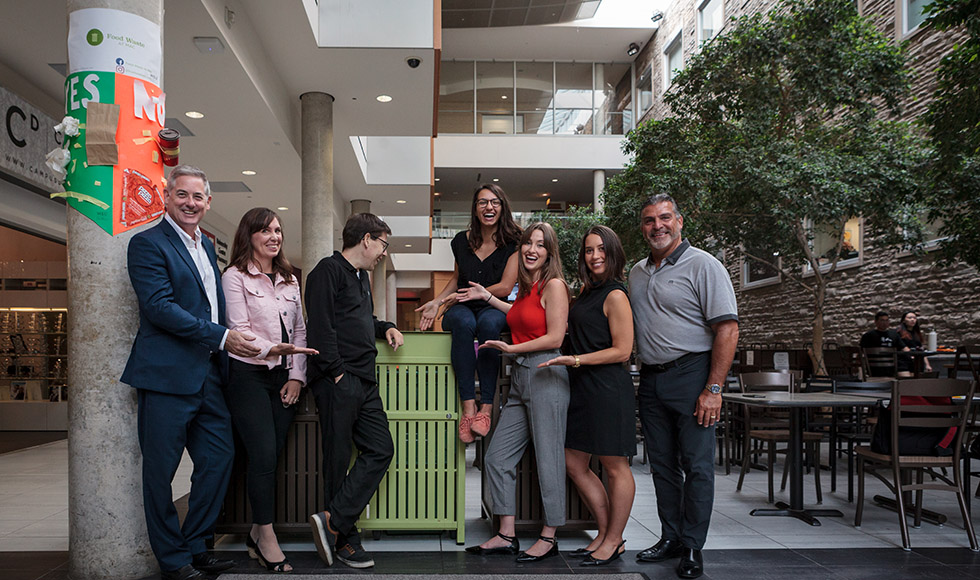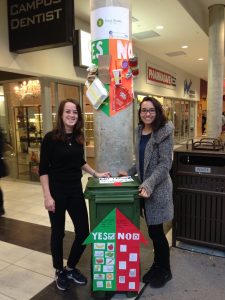What to do with your food waste? Two McMaster students have an answer for you

Project co-lead Alicia Giannetti (centre, seated) with project collaborators (L. to R.): Chris Roberts, Lori Diamond, Adam Chiavarelle, Fiona McGill, Kate Whalen, and Carlos Figueira. (Not pictured: Exchange student and project co-lead Amber van Druten.) Photo by: Sarah Janes
Imagine working on a great class project that helps the environment – and then winning a $5,000 award for your work. That’s what happened to Alicia Giannetti and Amber van Druten.
Last fall, they enrolled in SUSTAIN 3S03 Implementing Sustainable Change, a third-year undergraduate course open to students across all Faculties at McMaster. Sixty per cent of the course grade is an experiential project. Separately, Giannetti and van Druten chose “food waste” from among the broad topics offered, so they were paired as a team.
When they sat down to brainstorm where to focus their project, Amber noticed Alicia carefully repacking her banana peel and apple core to take home. When Alicia explained there was no place to compost that waste, their idea was born.
For three months, the two students conducted extensive research – including experimenting with signage and even sitting by their compost bin to see if it was being used. They collaborated with staff members across campus and ultimately succeeded in getting a permanent, public-facing compost bin set up.
You’ll find the new compost bin – painted a light green – across from Union Market in the McMaster University Student Centre (MUSC).
That would have been reason enough to celebrate. But in June, Giannetti and van Druten learned they were the inaugural recipients of the Climate Change and Health – Innovation Award, which comes with a $5,000 prize for the winning team to share among themselves.
Established in 2017 by two graduates of the Michael G. DeGroote School of Medicine and their family, the new award was created for students enrolled for credit in any of the four SUSTAIN courses (1S03, 2S03, 3S03, and 4S06) offered through the Academic Sustainability Programs office.
The donors, who wish to remain anonymous, set up the award to encourage students to study climate change, examine how it has a significant impact on human health – and come up with innovative solutions.

Giannetti has just graduated from McMaster with a double honours degree in sociology and religious studies, and a minor in sustainability. “Honestly, we are so shocked that we are the recipients of the award,” she says. Her career goal is to “help change human habits” through work that supports the environment and promotes sustainability.
Van Druten was an exchange student at Mac in 2017-18. She writes from the Netherlands, where she has returned to complete her studies in neuroscience at the University of Amsterdam: “I was also so surprised that our project won. We put a lot of effort into this project and it is amazing to see how a collaboration among partners could ensure that there’s now a permanent compost bin in the student centre.”
Giannetti and van Druten are quick to thank the donors who made the award possible, as well as their many campus collaborators from McMaster, MUSC, and the McMaster Students Union (MSU).
These collaborators included: Chris Roberts, director of Hospitality Services; Carlos Figueira, director of Facility Services; Lori Diamond, director of MUSC; Fiona McGill, chair of the MSU Sustainability Education Committee; and Michael Mikulak, the course instructor. Adam Chiavarelle, a recent Mac grad, served as “Co-Community Project Champion” along with Chris Roberts.
The project has helped to kickstart a wider campus effort with new compost bins planned for select buildings across campus. A campus education campaign is in the works.
Kate Whalen is senior manager of the Academic Sustainability Programs (ASP) office. She notes that both Fiona McGill and Adam Chiavarelle were students in previous ASP courses. “It’s inspiring to know that previous students are not only applying what they’ve learned beyond their courses, they are also mentoring and supporting current students.”
Whalen also acknowledges the three class projects that received honorary mentions: “Growing Bridges,” “Daily School Ride,” and “Mobile Greenhouse Project.”
She describes SUSTAIN 3S03 as a living laboratory in which great things can happen. “We want to inspire students to realize that their education extends well beyond the classroom.”
Learn more about the winning project, “Food Waste at Mac: Sustainable Composting Initiative”:
- https://asp.mcmaster.ca/wp-content/uploads/2018/05/3S03-Course-Report-2017.pdf#page=10
- https://www.facebook.com/foodwasteatmac/
Learn more about McMaster’s Academic Sustainability Programs at https://asp.mcmaster.ca/


